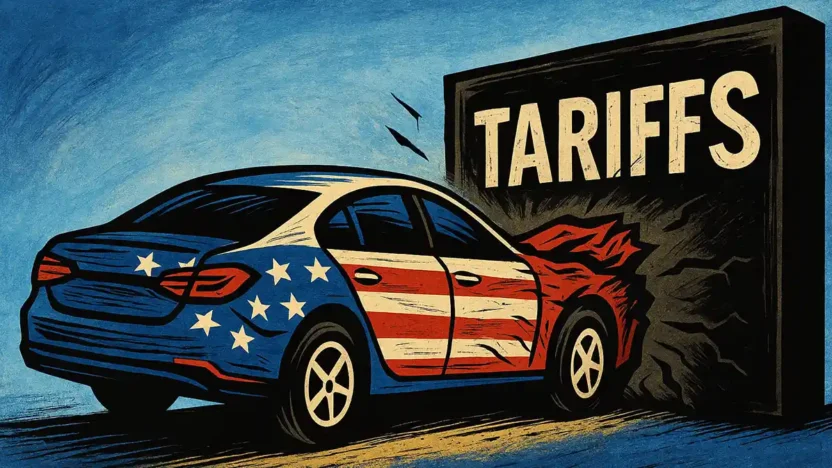President Trump’s decision to impose a 25% tariff on imported vehicles has shaken global markets and strained relations with some of America’s closest allies. With the auto industry at the centre of a $474 billion supply chain, the move triggered an immediate selloff in automaker stocks and raised fears of a broader trade rupture. From Tokyo to Berlin, the response has been fast, furious, and still gathering momentum.
Trump’s Auto Tariff Announcement Sends Shock Through Global Markets
Global automotive shares took a sharp turn lower on Thursday after President Donald Trump revealed plans to slap a 25% tariff on imported vehicles. The move marked a significant escalation in the trade tensions already simmering between the United States and its major allies, knocking the wind out of global indices and casting a long shadow over diplomatic ties.
The tariffs, covering cars and light trucks, are set to take effect on 3 April. That’s just one day after Trump plans to announce a second wave of reciprocal duties aimed at countries he claims are driving the U.S. trade deficit. If the aim was to provoke a reaction, it worked: markets braced for blowback, while international partners questioned whether this was economic policy or geopolitical theatre.
Global Auto Trade in the Firing Line: $474 Billion Now at Risk
In 2024, the United States imported an immense $474 billion worth of automotive goods, including $220 billion in passenger vehicles. Much of that came from trusted trade partners: Mexico, Japan, South Korea, Canada, and Germany. Which makes Washington’s latest tariff salvo not just economically disruptive, but diplomatically provocative.
| Country | Value (Billions) |
|---|---|
| Mexico | 49.98 |
| Japan | 40.76 |
| South Korea | 38.02 |
| Canada | 28.4 |
| Germany | 25.6 |
U.S. Allies Condemn Tariffs as Economic and Political Fallout Spreads
Reactions from allies were swift and anything but subtle. European Commission President Ursula von der Leyen dismissed the move as:
bad for businesses, worse for consumers
Canadian Prime Minister Mark Carney didn’t hold back, calling the tariffs a “direct attack” on Canadian workers. Over in Berlin, Economy Minister Robert Habeck demanded a “firm response” from Brussels and warned that the EU “will not take this lying down.”
Translation: expect fireworks.
Automakers in Japan, South Korea, and Germany Lead Global Selloff
Global markets didn’t wait around. Shares in major automakers across Japan, South Korea, and Germany dropped sharply, reflecting the industry’s deep exposure to U.S. trade policy shocks. In Tokyo, Prime Minister Shigeru Ishiba said his government was weighing “all options” in response. Seoul, meanwhile, wasted no time in rolling out an emergency plan to support its automotive sector, hinting at the scale of potential disruption.
U.S. Carmakers Caught in Cross-Border Crossfire as Supply Chains Strain
It wasn’t just foreign firms feeling the squeeze. American automakers rely heavily on supply chains running through Canada and Mexico, and they also came under pressure. Pre-market screens lit up with losses across the sector. Volkswagen, to name just one, sources 43 percent of its U.S. sales from Mexico, according to S&P Global Mobility. In an industry built on global assembly lines with zero margin for delay, tariffs don’t just sting. They pull at the seams.
Trade Experts Sound the Alarm as Trump Warns of Larger Tariffs

Industry analysts were quick to warn that tariffs on imported vehicles could push prices higher and choke off demand across the global auto sector. Kyle Rodda of Capital.com put it bluntly: “This potentially drags out trade uncertainty even longer and raises the question of how radical a change to the global trade order is Trump trying to bring about?”
Not everyone was opposed. The United Auto Workers union backed the move, reflecting long-standing frustration over offshore manufacturing and job losses at home. But markets weren’t convinced. Investors braced for retaliatory tariffs, particularly from the EU and Canada, where officials had already hinted at a coordinated response.
Trump didn’t wait for their move. Speaking early Thursday, he warned that “far larger tariffs” would follow if Brussels and Ottawa hit back together.



